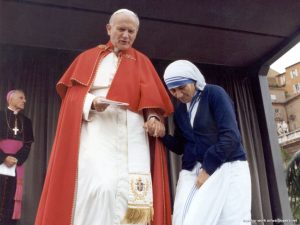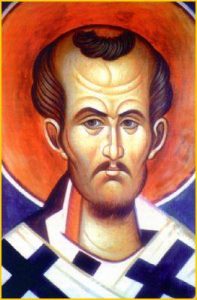 “Do you want to honor Christ’s body? Then do not scorn him in his nakedness, nor honor him here in the church with silken garments while neglecting him outside where he is cold and naked. For he who said: This is my body, and made it so by his words, also said: You saw me hungry and did not feed me, and inasmuch as you did not do it for one of these, the least of my brothers, you did not do it for me. [Mat 25:34ff]. What we do here in the church requires a pure heart, not special garments; what we do outside requires great dedication.”
“Do you want to honor Christ’s body? Then do not scorn him in his nakedness, nor honor him here in the church with silken garments while neglecting him outside where he is cold and naked. For he who said: This is my body, and made it so by his words, also said: You saw me hungry and did not feed me, and inasmuch as you did not do it for one of these, the least of my brothers, you did not do it for me. [Mat 25:34ff]. What we do here in the church requires a pure heart, not special garments; what we do outside requires great dedication.”
Gregory Polan elected 10th Abbot Primate of the Benedictines
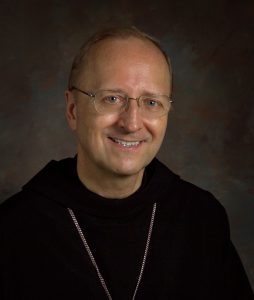 Father Gregory Polan, 66, until now, Abbot of Conception Abbey, has been elected the 10th Abbot Primate, succeeding Abbot Notker Wolf who has served in the position of Abbot Primate since being elected by the Congress of Abbots on 7 September 2000.
Father Gregory Polan, 66, until now, Abbot of Conception Abbey, has been elected the 10th Abbot Primate, succeeding Abbot Notker Wolf who has served in the position of Abbot Primate since being elected by the Congress of Abbots on 7 September 2000.
Abbot Gregory has been the 9th Abbot of Conception since November 6, 1996. He was professed in 1971 and ordained in 1977. He is a native of Berwyn, Illinois.
Abbot Gregory is the second abbot of Conception Abbey to be elected Abbot Primate. Abbot Marcel Rooney was the 8th Primate having been elected on September 18, 1996 and resigned on 3 September 2000.
Abbot Gregory is the fourth American to be elected to the Office of Abbot Primate. The others were Dom Rembert Weakland (now retired archbishop of Milwaukee); the late Abbot Jerome Theisen, and Abbot Marcel Rooney.
According to the Proper Law which governs the Confederation of Congregations of Monasteries of the Order of Saint Benedict, the ministry of the Primas is described as “the office of the Abbot Primate whose function it is to represent the Confederation and to do all he can to foster co-operation between the confederated monasteries.”
Abbot Notker was born on 21 June 1940, professed a monk of the Archabbey of St. Ottlien in 1962, ordained in 1968, elected Archabbot of his community in 1977, elected Abbas primas and Abbot of Sant’Anselmo 7 September 2000. He served three terms.
In the decree Inæstimabilis unitatis (16 September 1894) of Pope Leo XIII, gave the office of abbot primate to the Benedictines. The Primate has no direct authority the vast number of Benedictine houses (but there are Benedictine monasteries he is responsible for). There are approximately 7000 Benedictine monks. Polan becomes the abbot of the monastery Sant’ Anselmo. As THE Benedictine leader, he is the point of communio for the worldwide Benedictine Confederation and he who works as the primary liaison with the Holy See. Abbot Gregory is recognized as being a pastoral abbot and spiritual leader and well regarded across various sectors. Professionally, he is a scholar of Sacred Scripture and has the skills of a musician. Under his leadership a new English translation of the Book of Psalms that has been adopted by the US Catholic Bishops and Rome as the translation that’s used in the Liturgy.
Francis to the Abbots
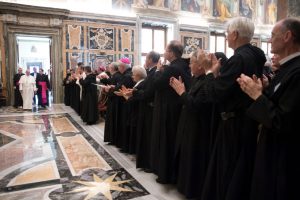 [Zenit] Pope Francis today received in audience some 250 participants in the congress of Benedictine abbots and abbesses gathered in Rome to reflect on the monastic charism received from St. Benedict and their faithfulness to it in a changing world.
[Zenit] Pope Francis today received in audience some 250 participants in the congress of Benedictine abbots and abbesses gathered in Rome to reflect on the monastic charism received from St. Benedict and their faithfulness to it in a changing world.
This theme acquires special meaning in the context of the Jubilee of Mercy since, as Francis affirmed, “if it is only in the contemplation of Jesus Christ that we perceive the merciful face of the Father, monastic life constitutes a privileged route to achieve this contemplative experience and to translate it into personal and community witness”.
Today’s world clearly demonstrates the need for a mercy that is the heart of Christian life and “which definitively manifests the authenticity and credibility of the message of which the Church is the depository, and which she proclaims. And in this time and in this Church, called to focus increasingly on the essential, monks and nuns safeguard by vocation a peculiar gift and a special responsibility: that of keeping alive the oases of the spirit, where pastors and faithful can draw from the wellsprings of divine mercy.”
With the grace of God and seeking to live mercifully in their communities, monks and nuns “announce evangelical fraternity from all their monasteries spread out in every corner of the globe, and they do so with that purposeful and eloquent silence that lets God speak out in the deafening and distracted life of the world”.
Therefore, although they live separated from the world, their cloistered life “is not barren: on the contrary, an enrichment and not an obstacle to communion”.
Their work, in harmony with prayer, enables them to participate in God’s creative work and shows their “solidarity with the poor who cannot live without work”.
Their hospitality allows them to encounter the hearts of the “most lost and distant, of those who are in a condition of grave human and spiritual poverty”, and their commitment to the formation of the young is highly appreciated. “Students in your schools, through study and your witness of life, can too become experts in that humanity that emanates from the Benedictine Rule. Your contemplative life is also a privileged channel for nurturing communion with the brothers of the Oriental Churches”.
“Your service to the Church is very valuable”, he concluded, expressing his hope that the Congress may strengthen the Federation so that it is increasingly at the service of communion and cooperation between monasteries and urging the Benedictines not to be discouraged if their members age or diminish in number. “On the contrary”, he emphasised, “conserve the zeal of your witness, even in those countries that are most difficult today, with faithfulness to your charism and the courage to found new communities”.
Nativity of Mary
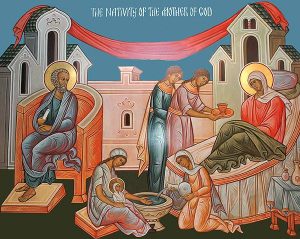 “By Your Nativity, O Most Pure Virgin, / Joachim and Anna are freed from the reproach/disgrace of barrenness; / Adam and Eve, from the corruption of death. / And we, your people, freed from subjection to sin, celebrate and sing to you: / The barren woman gives birth to the Theotokos, the nourisher of our life!”
“By Your Nativity, O Most Pure Virgin, / Joachim and Anna are freed from the reproach/disgrace of barrenness; / Adam and Eve, from the corruption of death. / And we, your people, freed from subjection to sin, celebrate and sing to you: / The barren woman gives birth to the Theotokos, the nourisher of our life!”
(Byzantine Kontakion-hymn of the Nativity of the Theotokos)
The Liturgy for the great feast of the Nativity of Mary is full of theology that we can not walk away from, even if they are difficult theological concepts, like “corruption of death” and “subjection to (liabilty for) sin,” referring to our human state before Christ. The beauty of the poetry here to convey what we believe is stunning: the mention of Jesus Christ annulling our “curse” in another well-known hymn, the Troparion of the feast: “By annulling the curse He bestowed a blessing, by destroying death, He gave us eternal life.” What does it mean for us today?
A key to unlock the importance of this feast is understanding the generation before Mary: Saints Joachim and Anna. These two experienced in their life, in their experience, what the Kontakion above speaks of “disgrace of barrenness” or “chidlessness.” Consider what it means for a woman to experience the inability to conceive, or to experience the death of her infant child. What God did was to free Anna from the paralyzing “barrenness” of her body and give her an incomparable blessing –the gift of Life. With Joachim and Anna, God intervened in human history making it possible for them to “live” to their full potential by giving birth to Mary. Life makes all the difference.
The feast is, as St. Andrew of Crete describes it, “the beginning of feasts. It represents the first of the feasts against the Law and the shadows, yet also the entrance of those that lead to grace and truth.”
The Source of Life in His creative energies allows humans to be truly productive and truly human when it was impossible. So today we honor Mary, but we also honor her parents, Joachim and Anna, “the barren woman gives birth.” THE Good News here is that God the Father bestows the same blessing on the Church. As one theologian said, He continues to bless “an ever God-Bearing Church.”
St Teresa –thirsting for God
 I saw this picture of Servant of God Dorothy Day and Saint Teresa and wondered what they talked about. Did they pray? I wondered what the visit meant to each of them, and what was the lasting impact the meeting had for them and their co-workers. Saints meet saints and encourage others to be saints.
I saw this picture of Servant of God Dorothy Day and Saint Teresa and wondered what they talked about. Did they pray? I wondered what the visit meant to each of them, and what was the lasting impact the meeting had for them and their co-workers. Saints meet saints and encourage others to be saints.
The other day Cardinal Pietro Parolin concluded a homily by remembering the two simple words of the newly canonized Saint Teresa of Calcutta posted in every house of the Missionaries of Charity: ‘I thirst’.
‘I thirst,’ the cardinal said, ‘a thirst for fresh, clean water, a thirst for souls to console and to redeem from their ugliness to make them beautiful and pleasing in the eyes of God, a thirst for God, for His vital and luminous presence. I thirst; this is the thirst which burned in Mother Teresa: her cross and exaltation, her torment and her glory.’
Both Dorothy Day and Saint Teresa give witness to thirsting for God.
Saint Teresa of Calcutta, pray for us!
St Benedict’s Legacy on Work
Our Catholic Faith, I believe, has something important to say to the concerns of post-modernity, especially regarding matters of faith and reason AND faith and the public order. Work –our labor– is one of those things that Catholicism speaks eloquently about. We still live with the legacy of Marx and his kind when it comes to understanding the role and place of work. Contrary to Marxism’s theory of alienation, we would say, human labor does have meaning and there is a dignity to the process of work and the worker.
The following is an excerpt of a 1980 letter sent to the Benedictines by John Paul II on the 1500th anniversary of monastic life. John Paul writes:
Man’s face is often wet with tears impelling him to pray, but these tears do not always spring from sincere compunction or excessive joy. For often tears of sorrow and disturbance ow from those whose human dignity is disregarded, those who cannot achieve what they justly desire, and who cannot do the work that suits their needs and talents.
St Benedict lived in a civil society deformed by injustices. The human person frequently counted for nothing and was treated as a criminal. In a social structure drawn up in orders, the most wretched were segregated and reduced to slavery. The poor grew poorer, while the rich grew richer and richer. Yet this remarkable man willed to found the monastic community on the prescriptions of the Gospel. He restored man to his integral condition, no matter what social order or rank he came from. He provided for the needs of each according to the norms of a wise distributive justice. He assigned significant duties to individuals, duties which cohered aptly with other duties. He considered the conditions of the weak, but left no room for easy laziness. He allowed space for the cleverness of others lest they feel hemmed in, or rather, so that they might be stimulated to give their best. Thus he removed the pretext of a light and sometimes justified murmuring, and brought about the conditions of true peace.
Man is not reckoned by St Benedict as a kind of nameless machine, which someone uses to get the maximum profit, providing no moral justification to the worker and denying him a just wage. It should be noted that in his time work was usually done by slaves who were denied the status of human beings. Benedict considered work, however it happens to be done, as an essential part of the life and obliges each monk to it, making it a duty in conscience. This labor is to be borne ‘for the sake of obedience and expiation’, since indeed pain and sweat are attached to any truly efficacious effort. But this distress has a redemptive character when it purifies a man from sin, and it ennobles the things carefully worked on and also the environment where the work is done.
St Benedict, leading an earthly life in which work and prayer were properly balanced, in this way happily inserts work into the supernatural way of considering life. By doing so, he helps man to know himself as God’s fellow-worker, and truly he becomes such when his person, acting with a certain creative energy, is enhanced in an all-round way. Human action is carried out in a contemplative manner, and contemplation attains a certain dynamic quality. It influences the work itself and throws light on the ends proposed for the work.
Work is, therefore, not performed solely in order to avoid the idleness which enfeebles minds, but also and indeed chiefly, to enable a man to grow gradually as a person mindful of his duties and careful about them. Also, talents perhaps concealed deep inside the person may be discovered, and brought to fruition for the common good, ‘so that in all things God may be glorified’.
Work is not relieved of its burden of the harsh clash of forces, but a new interior impulse is added to it. The monk is united to God not in spite of his work but through it, because ‘while working with hand or mind he continually raises himself to Christ’.
Thus it happens that even lowly and insignificant work is done with a certain dignity, and becomes a vital part of ‘that sovereign effort by which God alone is sought in solitude and silence, so that to such a life is added the vigor of continual prayer, the sacrifice of praise, celebrated and consummated together, under the influence of cheerful fraternal charity’.
Europe became a Christian land chiefly because sons of St Benedict gave our ancestors a comprehensive instruction, not only teaching them arts and crafts but also infusing into them the spirit of the Gospel which is needed for the protection of the spiritual treasures of the human person. The paganism which was formerly drawn over to the Gospel by the many hands of missionary monks is now spreading more and more in the Western world, and it is both the cause and the effect of the loss of the Christian way of esteeming work and its dignity.
Unless Christ endows human action with a constant lofty meaning, the worker becomes the slave –a special kind of slave unique to modern times– of profit and industry. On the contrary, Benedict affirms the urgent necessity of giving a spiritual character to work, enlarging the purpose of human labour so that it can escape the excessive application of the technical arts and the excessive greed for what is useful to one’s self.
(An excerpt from Pope St John Paul II’s 1980 Apostolic Letter for the Fifteenth Centenary of the Birth of St Benedict)
Saints in communion
Today, Pope Francis proclaimed Mother Teresa of Calcutta a saint.
“Let us conquer the world with our love. Let’s us interweave our lives with bonds of sacrifice and love, and it will be possible for us too conquer the world.”
“we can do no great things – only small things with great love”
St. Teresa of Calcutta, pray for us
Blessed Mary Stella and Companions
 Today is the feast day of Blessed Mary Stella and her ten companions. Members of the Congregation of Sisters of the Holy Family of Nazareth. It is a day to recall the supreme witness of love and patience and virtue. We honor the lives and the love shared by the Blessed Martyred Sisters of Nowogrodek who were executed by the Nazis on August 1, 1943, and beatified by Pope St. John Paul II on March 5, 2000.
Today is the feast day of Blessed Mary Stella and her ten companions. Members of the Congregation of Sisters of the Holy Family of Nazareth. It is a day to recall the supreme witness of love and patience and virtue. We honor the lives and the love shared by the Blessed Martyred Sisters of Nowogrodek who were executed by the Nazis on August 1, 1943, and beatified by Pope St. John Paul II on March 5, 2000.
Through their sacrifice of love, the lives of many were spared.
We remember:
Sr. Maria Stella (Adelaide) Mardosewicz, superior, 1888-1943
Sr. Mary Imelda (Jadwiga) Zak, 1892-1943
Sr. Mary Rajmunda (Anna) Kukolowicz, 1892-1943
Sr. Maria Daniela (Eleanor) Jozwik, 1895-1943
Sr. Maria Kanuta (Jozefa) Chrobot, 1896-1943
Sr. Maria Gwidona (Helena) Cierpka, 1900-1943
Sr. Maria Sergia (Julia) Rapiej, 1900-1943
Sr. Maria Kanizja (Eugenia) Mackiewicz, 1904-1943
Sr. Maria Felicyta (Paulina Borowik) 1905-1943
Sr. Maria Heliodora (Leokadia) Matuszewska, 1906-1943
Sr. Maria Boromea (Veronika) Narmontowicz, 1916-1943
Photo (undated) shows some of the sisters during a Corpus Christi procession in Nowogrodek.
St Teresa of Calcutta
 Mother Teresa, in all aspects of her life, was a generous dispenser of divine mercy, making herself available for everyone through her welcome and defence of human life, those unborn and those abandoned and discarded. She was committed to defending life, ceaselessly proclaiming that “the unborn are the weakest, the smallest, the most vulnerable”. She bowed down before those who were spent, left to die on the side of the road, seeing in them their God-given dignity; she made her voice heard before the powers of this world, so that they might recognize their guilt for the crime of poverty they created. For Mother Teresa, mercy was the “salt” which gave flavour to her work, it was the “light” which shone in the darkness of the many who no longer had tears to shed for their poverty and suffering.
Mother Teresa, in all aspects of her life, was a generous dispenser of divine mercy, making herself available for everyone through her welcome and defence of human life, those unborn and those abandoned and discarded. She was committed to defending life, ceaselessly proclaiming that “the unborn are the weakest, the smallest, the most vulnerable”. She bowed down before those who were spent, left to die on the side of the road, seeing in them their God-given dignity; she made her voice heard before the powers of this world, so that they might recognize their guilt for the crime of poverty they created. For Mother Teresa, mercy was the “salt” which gave flavour to her work, it was the “light” which shone in the darkness of the many who no longer had tears to shed for their poverty and suffering.
Her mission to the urban and existential peripheries remains for us today an eloquent witness to God’s closeness to the poorest of the poor. Today, I pass on this emblematic figure of womanhood and of consecrated life to the whole world of volunteers: may she be your model of holiness! May this tireless worker of mercy help us to increasingly understand that our only criterion for action is gratuitous love, free from every ideology and all obligations, offered freely to everyone without distinction of language, culture, race or religion. Mother Teresa loved to say, “Perhaps I don’t speak their language, but I can smile”. Let us carry her smile in our hearts and give it to those whom we meet along our journey, especially those who suffer. In this way, we will open up opportunities of joy and hope for our many brothers and sisters who are discouraged and who stand in need of understanding and tenderness.
excerpt from Pope Francis’ homily
4 September 2016
St Gregory the Great
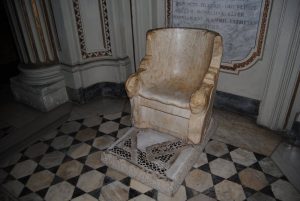 Today is the feast of Saint Gregory the Great, monk and Roman Pontiff. In the Mass Collects for Saint Gregory there is reference to truth and charity. The connection is inseparable to the point of being real clear for our own apostolic life.
Today is the feast of Saint Gregory the Great, monk and Roman Pontiff. In the Mass Collects for Saint Gregory there is reference to truth and charity. The connection is inseparable to the point of being real clear for our own apostolic life.
Here is a picture of the Throne of Pope Saint Gregory the Great inside his former home now called the Church of San Gregorio on Clelian Hill, Rome. The throne is a visible sign of the teaching authority of the Pontiff. Several years I had the chance to sit in the chair for a brief second. And guess what: I am still not a pontiff. There is a message here don’t you think?
The Clelian Hill monastery has a colony of Benedictine Camaldolese monks with a convent the Missionaries of Charity next door.
Saint Gregory pray for Pope Francis, and for us.
